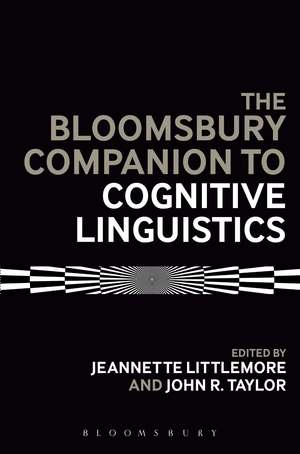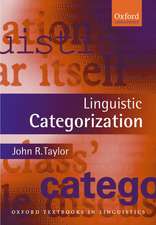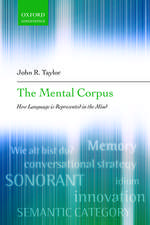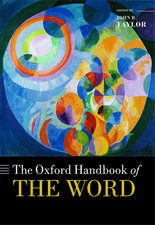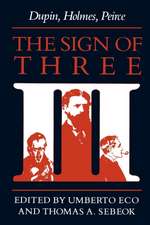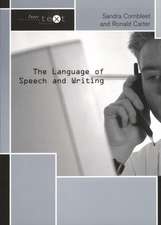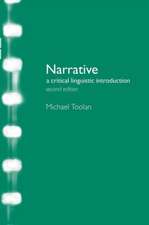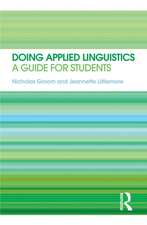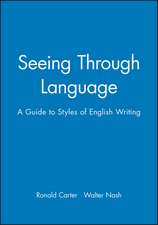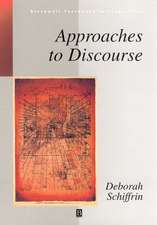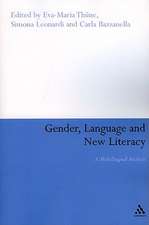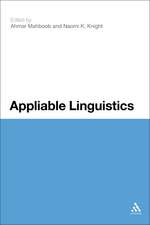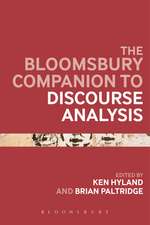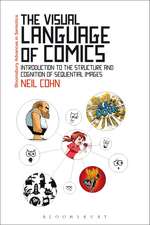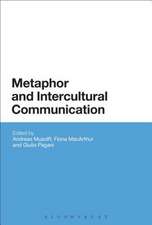The Bloomsbury Companion to Cognitive Linguistics: Bloomsbury Companions
Editat de Jeannette Littlemore, Dr John R. Tayloren Limba Engleză Paperback – 16 dec 2015
| Toate formatele și edițiile | Preț | Express |
|---|---|---|
| Paperback (1) | 263.56 lei 43-57 zile | |
| Bloomsbury Publishing – 16 dec 2015 | 263.56 lei 43-57 zile | |
| Hardback (1) | 914.95 lei 43-57 zile | |
| Bloomsbury Publishing – 18 iun 2014 | 914.95 lei 43-57 zile |
Din seria Bloomsbury Companions
- 43%
 Preț: 943.24 lei
Preț: 943.24 lei - 16%
 Preț: 258.54 lei
Preț: 258.54 lei - 21%
 Preț: 256.42 lei
Preț: 256.42 lei - 48%
 Preț: 626.47 lei
Preț: 626.47 lei -
 Preț: 822.27 lei
Preț: 822.27 lei - 17%
 Preț: 256.89 lei
Preț: 256.89 lei - 17%
 Preț: 257.81 lei
Preț: 257.81 lei - 44%
 Preț: 941.35 lei
Preț: 941.35 lei - 41%
 Preț: 226.40 lei
Preț: 226.40 lei -
 Preț: 771.53 lei
Preț: 771.53 lei - 12%
 Preț: 266.68 lei
Preț: 266.68 lei - 44%
 Preț: 940.38 lei
Preț: 940.38 lei - 17%
 Preț: 253.85 lei
Preț: 253.85 lei - 44%
 Preț: 937.45 lei
Preț: 937.45 lei - 45%
 Preț: 141.20 lei
Preț: 141.20 lei - 17%
 Preț: 254.58 lei
Preț: 254.58 lei - 27%
 Preț: 383.62 lei
Preț: 383.62 lei - 44%
 Preț: 938.96 lei
Preț: 938.96 lei - 7%
 Preț: 304.89 lei
Preț: 304.89 lei - 17%
 Preț: 239.59 lei
Preț: 239.59 lei - 12%
 Preț: 257.36 lei
Preț: 257.36 lei - 12%
 Preț: 255.97 lei
Preț: 255.97 lei - 17%
 Preț: 253.67 lei
Preț: 253.67 lei - 12%
 Preț: 264.39 lei
Preț: 264.39 lei - 16%
 Preț: 258.28 lei
Preț: 258.28 lei - 44%
 Preț: 937.06 lei
Preț: 937.06 lei - 41%
 Preț: 225.08 lei
Preț: 225.08 lei - 12%
 Preț: 254.58 lei
Preț: 254.58 lei - 22%
 Preț: 252.76 lei
Preț: 252.76 lei - 17%
 Preț: 255.51 lei
Preț: 255.51 lei - 41%
 Preț: 193.99 lei
Preț: 193.99 lei - 36%
 Preț: 871.22 lei
Preț: 871.22 lei - 44%
 Preț: 938.96 lei
Preț: 938.96 lei - 17%
 Preț: 254.14 lei
Preț: 254.14 lei -
 Preț: 930.14 lei
Preț: 930.14 lei - 11%
 Preț: 267.60 lei
Preț: 267.60 lei - 36%
 Preț: 944.19 lei
Preț: 944.19 lei - 10%
 Preț: 271.74 lei
Preț: 271.74 lei - 26%
 Preț: 1161.10 lei
Preț: 1161.10 lei - 43%
 Preț: 220.26 lei
Preț: 220.26 lei - 43%
 Preț: 925.87 lei
Preț: 925.87 lei -
 Preț: 270.06 lei
Preț: 270.06 lei
Preț: 263.56 lei
Preț vechi: 298.56 lei
-12% Nou
50.45€ • 54.82$ • 42.40£
Carte tipărită la comandă
Livrare economică 21 aprilie-05 mai
Specificații
ISBN-10: 1474237320
Pagini: 384
Dimensiuni: 156 x 234 x 20 mm
Greutate: 0.66 kg
Ediția:UK
Editura: Bloomsbury Publishing
Colecția Bloomsbury Academic
Seria Bloomsbury Companions
Locul publicării:London, United Kingdom
Caracteristici
Notă biografică
Jeannette Littlemore is a Reader in Applied Linguistics at the University of Birmingham, UK. She is the author of Applying Cognitive Linguistics to Second Language Learning and Teaching (2009, Palgrave Macmillan).John R. Taylor is Professor of Linguistics at the University of Otago, New Zealand. He is the author of Linguistic Categorization (2003), An Exploration in Cognitive Grammar (1996) and Cognitive Grammar (2002) all with Oxford University Press.
Cuprins
1. Introduction. Distinctive features of the Cognitive Linguistic approach to language study (Jeannette Littlemore, University of Birmingham UK and John Taylor, University of Otago, New Zealand)2. Major figures in Cognitive Linguistics. A retrospective view of the development of Cognitive Linguistics2.1 Langacker's Cognitive Grammar (Phil Bennett, University of Birmingham, UK)2.2 Lakoff's theory of Conceptual Metaphor (Dennis Tay, Hong Kong Polytechnic University, Hong Kong)2.3 Goldberg's Construction Grammar (Kris Ramonda, University of Birmingham, UK)2.4 Fauconnier's theory of mental spaces and conceptual blending (Brian Birdsell, University of Birmingham, UK)2.5 Tomasello's theory of first language acquisition (Sarah Turner, University of Birmingham, UK)2.6 Bybee's usage based models of language (Daniel Sanford, University of New Mexico, USA)3. Topics in Cognitive Linguistics research. A thematic overview of topics that have been actively researched by cognitive linguists.3.1 The Cognitive-Linguistic revolution in metaphor studies (Gerard Steen, VU Amsterdam, The Netherlands)3.2 On the nature and scope of metonymy in linguistic description and explanation: towards settling some controversies (Francisco Ruiz de Mendoza, University of Logroño, Spain)3.3 Embodied metaphor (Ray Gibbs Jr, University of California, Santa Cruz, USA)3.4 Idioms and phraseology (Frank Boers, University of Wellington, New Zealand)3.5 Cognitive Linguistics and language variation (Dirk Geeraerts and Gitte Kristiansen, University of Leuven, Belgium) 3.6 Cognitive poetics (Chloe Harrison and Peter Stockwell, University of Nottingham, UK)3.7 Cognitive Linguistics and ideology (Veronika Koller, University of Lancaster, UK)3.8 Phonology (Jose Antonio Mompean Gonzalez, University of Murcia, Spain)4. New directions and applications. Addresses those areas where there is scope for new developments.4.1 Corpus and quantitative methods (Stefan Th. Gries, University of California, Santa Barbara, USA)4.2 Non-linguistic applications of Cognitive Linguistics: On the usefulness of image-schematic metaphors in user interface design (Jörn Hurtienne, Julius-Maximilians-Universität Würzburg, Germany)4.3 Language acquisition and language pedagogy (Jörg Roche, Ludwig-Maximilians-Universität München, Germany)4.4 Metaphor theory for counselling professionals (Dennis Tay, Polytechnic University, Hong Kong)Index
Recenzii
This is a resource book for both beginners and advanced researchers in Cognitive Linguistics. It covers the basic topics as well as the current trends in Cognitive Linguistics. It includes the founding fathers' elaboration on their own very original theories that started the enterprise as Cognitive Linguistics as well as those currently active scholars' theories that have emerged in the progress of Cognitive Linguistics in the past few decades. This book should occupy a permanent place on every cognitive linguist's bookshelf.
This companion is a substantial and timely addition to the literature on Cognitive Linguistics. Its scope and depth make it attractive both for newcomers to the field and for established researchers. The section on New Directions and Applications, in particular, showcases some of the most promising and fascinating current developments in this expanding area of research.
This research companion provides an excellent state-of-the-art overview of contemporary cognitive linguistics. It introduces the reader to foundational cognitive linguistic frameworks such as cognitive grammar and construction grammar, conceptual metaphor, conceptual metonymy, and conceptual blending, as well as applications of cognitive linguistics in language acquisition and pedagogy, and recent advances in quantitative corpus linguistics. It will be an invaluable source of information and inspiration for the general reader and specialist alike.
Descriere
The Bloomsbury Companion to Cognitive Linguistics is a comprehensive and accessible reference resource to research in contemporary cognitive linguistics. Written by leading figures in the field, the volume provides readers with an authoritative overview of methods and current research topics and future directions.The volume covers all the most important issues, concepts, movements and approaches in the field. It devotes space to looking specifically at the major figures and their contributions. It is a complete resource for postgraduate students and researchers working within cognitive linguistics, psycholinguistics and those interested more generally in language and cognition.
